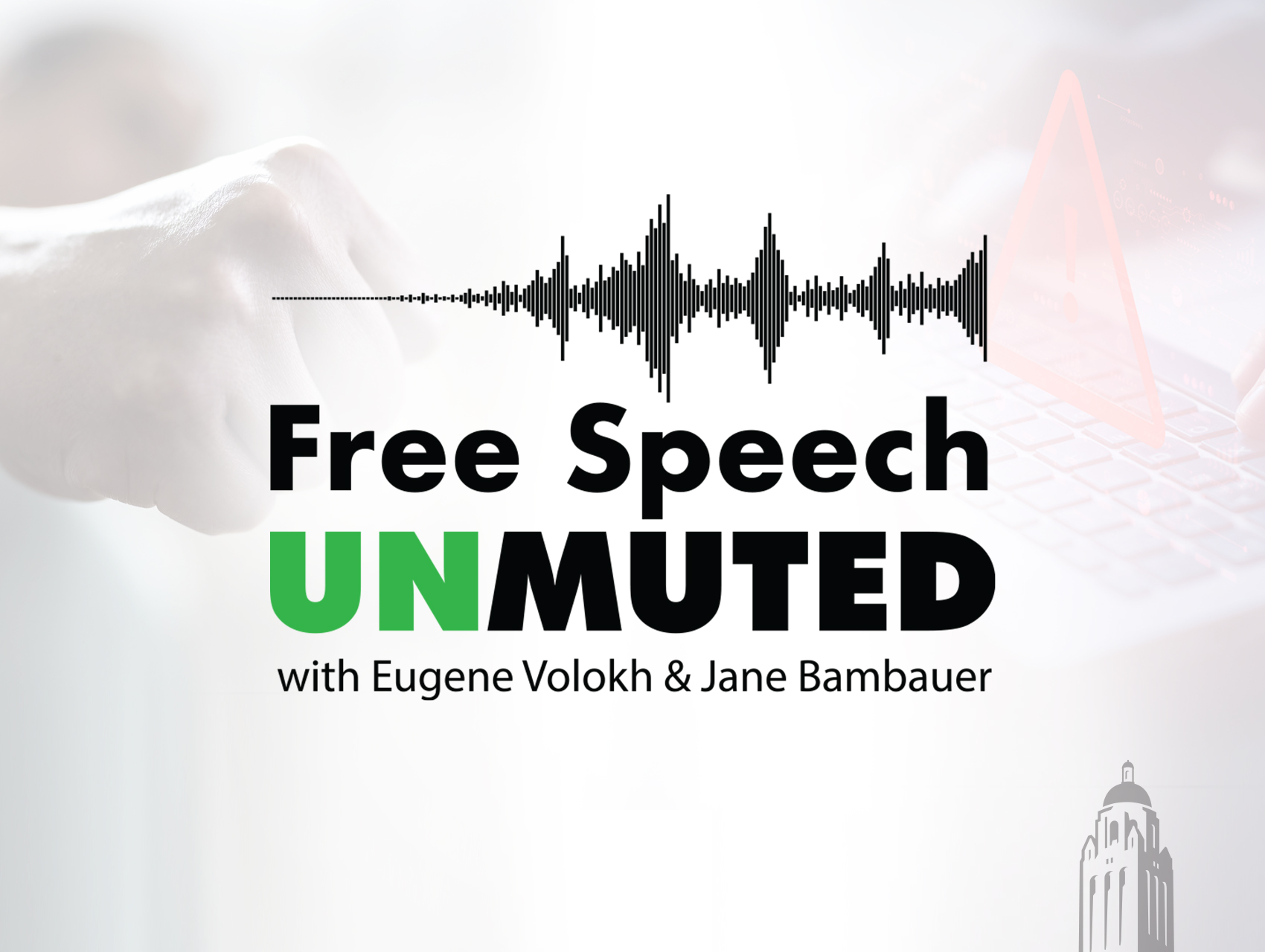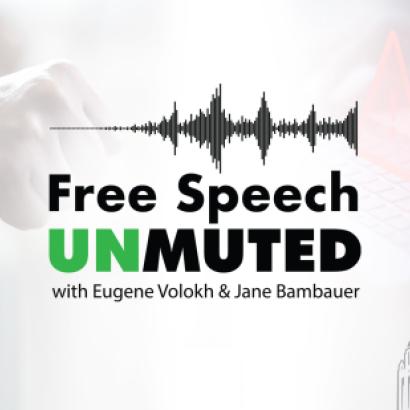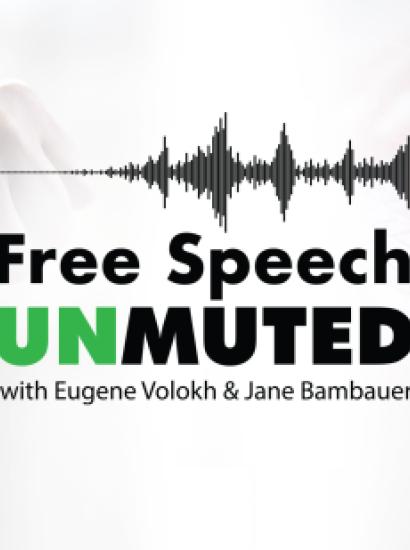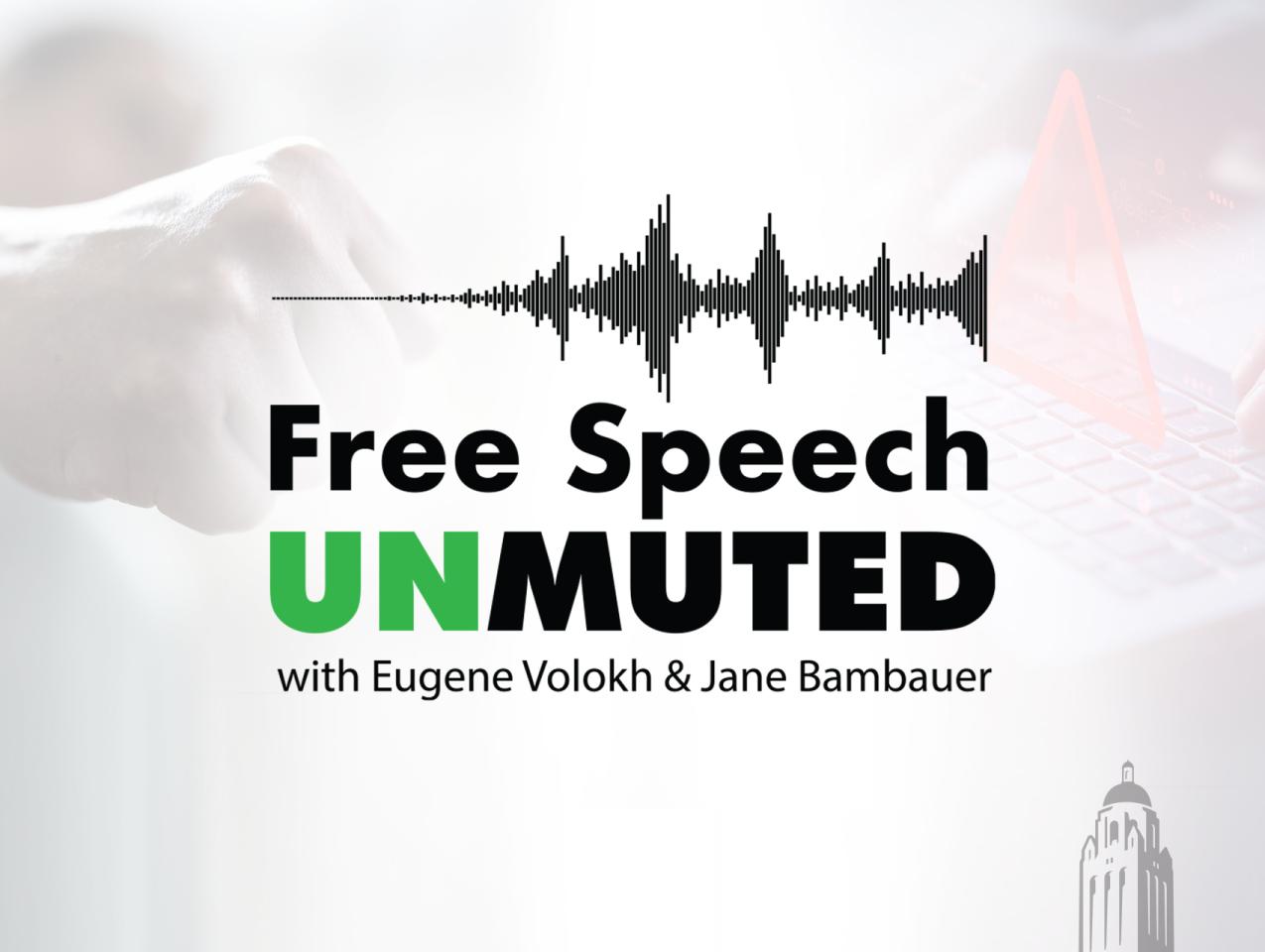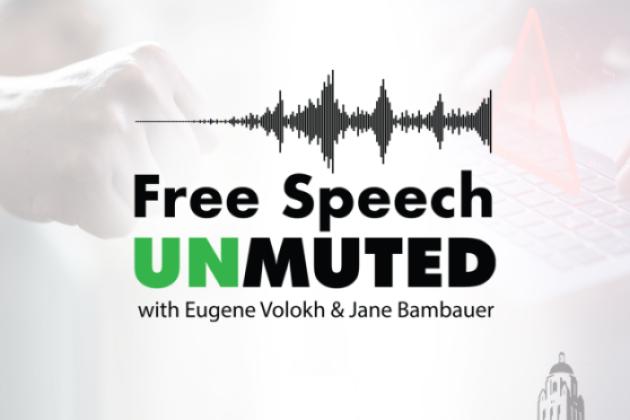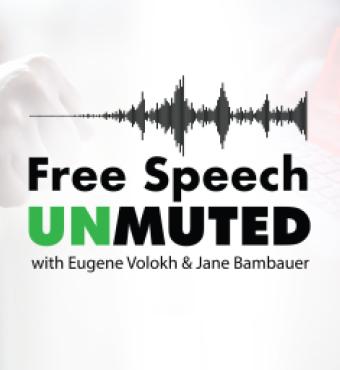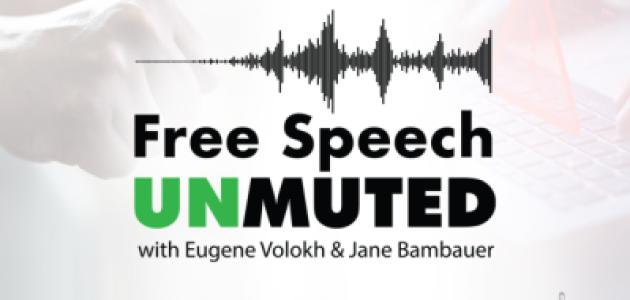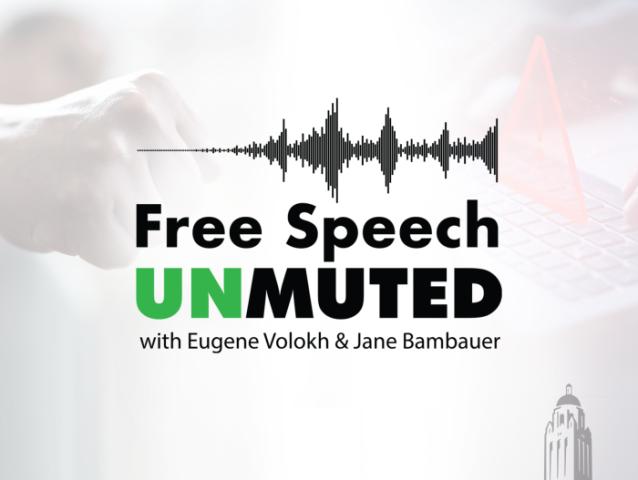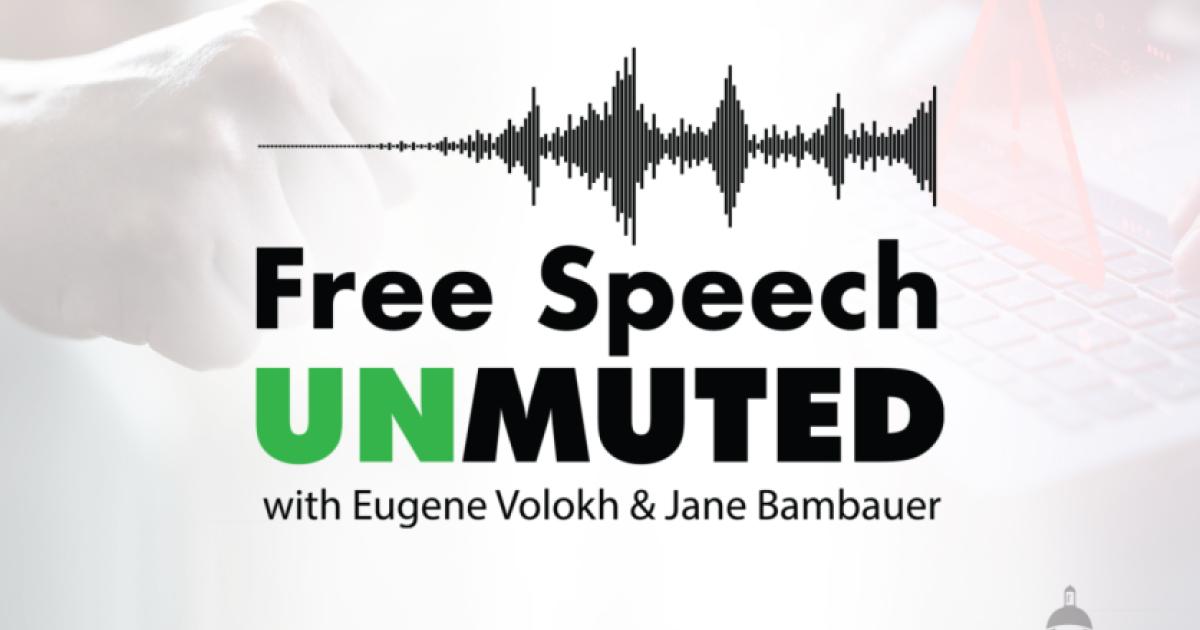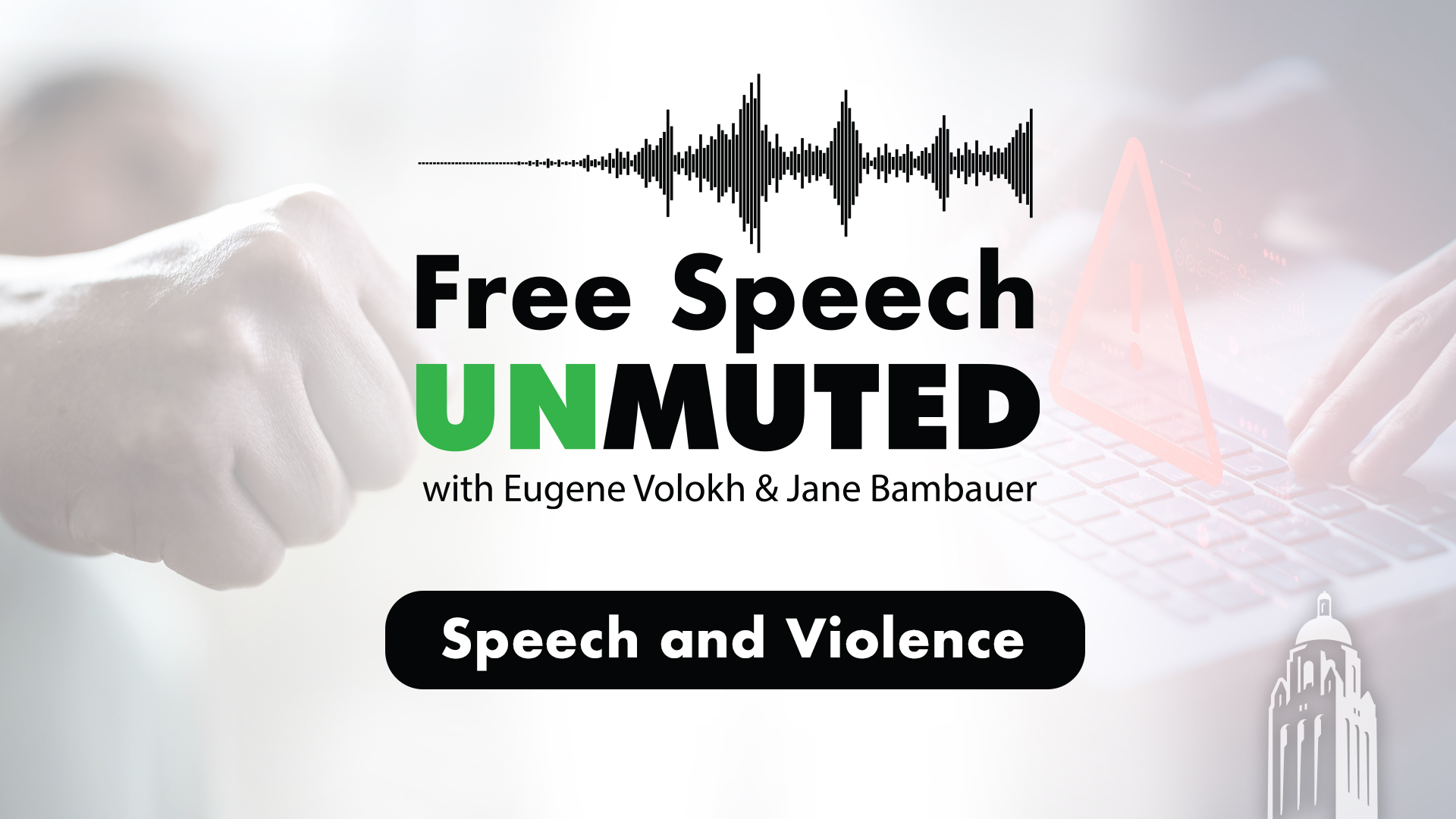Incitement, solicitation, fighting words, threats, bad tendencies, and more, with special attention to NAACP v. Claiborne Hardware Co. (1982), the Court’s little-publicized precedent on the subject.
Eugene Volokh: Hello. Welcome to Free Speech Unmuted, a Hoover Institution podcast. We are your hosts, Jane Bambauer at the University of Florida, and I'm at the Hoover Institution, and I'm now emeritus at UCLA Law School. Jane, what are we talking about today, and why today?
Jane Bambauer: We are talking about rhetoric that may lead to a climate of violence, and in the news quite a bit because as some of our listeners may be aware, there was an attempted assassination of former president Donald Trump.
And only a few days before that, President Biden had said something along the lines of, it's time to put Trump in the bullseye. That was somewhat reminiscent, by the way, for those who can remember more than I do. more than six months back, which is sometimes hard to do that may be reminiscent of Gabby Gifford's attempted assassination.
During that time, the news media was talking a lot about Sarah Palin's graphic showing a bunch of potentially winnable congressional districts and and the map had bullseyes on several districts, including Gabby Giffords. And then also, of course this is a theme that came up shortly after January 6th and has never really been fully resolved about how much responsibility a speaker and especially an important speaker like Trump or President Biden should hold both morally and maybe even legally for downstream violent acts.
So that's the topic. And, we just want to make sure, I think that listeners understand what is well settled within First Amendment precedent and what isn't. Eugene, why don't you remind us of what types of speech are, that might lead to violence are unprotected and which types still get protection despite their potential causal connection to the violence?
Eugene Volokh: Sure. So the First Amendment protects basically all sorts of ideas, including ideas about the propriety of violence. Advocacy of violent revolution is constitutionally protected. Just as an example, advocacy of all sorts of violence, advocacy of the propriety of killing political leaders, which is one feature of violent revolution, of course is protected as well.
But there are exceptions. to the First Amendment. And let's go through a few that are particularly important, partly because they exist, but also partly because of their narrowness. One, which people may be quite familiar with, it comes from a case called Brandenburg v. Ohio in 1969. And it's the incitement exception.
And it has three elements. Speech is unprotected, or rather abstract advocacy, let's say, is unprotected. If it is intended to, and likely to cause imminent lawless conduct. So classic example is if you're talking to a gathered mob and you're urging them to to do violent things, and it seems likely that they'll do them right away and that there's evidence that you intend to do them.
To have them do it right away, then that could be punishable incitement, deliberately very narrow exception. So for example, just saying, it's proper for people to assassinate political leaders. Here's my moral theory for that or whatever else. That's not incitement because it's not advocating for imminent.
Conducts advocating for conduct sometime in the future. A second exception is for solicitation. Now, this is much less talked about, but it's definitely there. The Supreme Court has recognized it in a couple of recent cases. Williams and Hanson are the names of those cases. And the boundaries are not completely clear, but it appears that it has to do with Calls that are not abstract advocacy of a crime, but they're much more concrete.
And usually, they'd be concrete in the sense of identifying a a particular victim, for example. Again, I'm inferring something from the cases and from the background criminal law of solicitation, but that seems likely. Identifying some particular victim or identifying some particular physical target for an attack.
So for example, if someone comes up with, here's a list of people you should. Faculty members on your university, you should beat up, not say you've been killed, beat up, or vandalize their offices, even if it doesn't say do it right away, even if the expectation is it would happen sometime later, say it's the middle of summer and nobody's around, everybody's on vacation, they'll be back in the fall.
It's not calling for imminent illegal conduct, but the specificity. of the target, the fact that particular people are named, coupled, I think, with the intention and the explicitly stated, especially, intention of causing illegal conduct against them. That is, I think, sufficient to make a punishable solicitation.
Now, there is another exception for another way in which crime can be caused. So far, we're talking about essentially persuading people to commit crime, but You could also anger people to the point that they act illegally. And there's an exception for so called fighting words. Fighting words are face to face personal insults that are likely to cause a fight.
And If if those elements are shown, it doesn't matter that the insulter may not want the fight. The fight might lead to him being punched in the face, right? Doesn't matter. You don't need that kind of intention. Because, again, it's face to face personal insult. Again, though the court has deliberately cabined this to make it a to make it quite narrow.
If it is a an impersonal statement, however personally the listener might take it, then it is not punishable. So for example, there was a case from the sixth circuit called Bible believers several years ago where people were essentially harshly insulting Islam and implicitly, that Muslims generally at a place where considerable number of Muslims were gathered for a festival.
And the court said, that's, that is, that remains protected speech, at least until somebody says, yeah, you, I'm talking about you person. So those are the key exceptions here. There's also another one, which isn't about, fomenting illegal conduct, but making people fearful of illegal conduct, that's the true threats exception.
So if I say, I'm going to kill you, or we, my people and I, are going to kill you, then in that case, that could be a punishable threat. It has to be a true threat as opposed to hyperbole or fiction or an obvious joke or something like that. But it is also punishable. But outside of those areas, generally speaking, speech is protected even when it causes causes an environment in which violence is potentially more likely.
And one way of thinking about it is to think about The older law the legal rules that Brandenburg the Ohio, that incitement case de deliberately overruled in some measure, I oversimplify her ba. But basically that in the 19 teens and twenties, the court developed a doctrine, which has been known as the Bad Tendency Test.
That speech can be restricted if it has a tendency to cause criminal conduct. In the 19 teens, that conduct was evading the draft during World War I. There were several Supreme Court cases on that. Afterwards, it was essentially revolutionary violence, attempted revolutionary violence.
Jane Bambauer: I think this is a moment where people instinctively Are wondering why we don't have something that's more like the bad tendency test, because they think, you're, it makes, in fact as as Justice Holmes himself would say, it seems perfectly logical to, to think if I say something that a lot of people are going to hear, and some of them will take it seriously, and some subset of those people will actually act on the matter, then you can totally predictably.
Cause violence that wouldn't have been there before. So maybe if you don't mind, why was it that the Supreme Court went from that era to the Brandenburg era that we have now?
Eugene Volokh: So that is exactly the right question. Um, and the answer is, some form of we tried it and we didn't like it. Now, of course, one might ask, who's this we, right?
Maybe many of us might like it. Maybe it's just the Supreme Court and kind of the liberal elites, as it were, that from which the Supreme Court was drawn didn't like it. But basically, this the court had to face throughout based from the late twenties onto the sixties, the reality that when people are sharply condemning, The existing.
legal order, whether because they're on the left or on the right or civil rights advocates or anti civil rights advocates, when they're sharply condemning the existing political order as necessarily needs to be allowed in a democracy. You could have a situation where 99 percent of the people, of the audience is going to is going to some of them will agree, some will disagree, but the consequences will be political.
They may vote a particular way, or they may express their own views or whatever else, and then maybe 1 percent or even a fraction of 1 percent will act violently. You can't, the court concluded, you can't suppress the harsh criticism. And interfere with the ability to talk to the 99 percent just because of a risk of violence by the 1 percent or again, usually the violence is by a lot less than 1%.
And that is also includes speech about particular people, at least so long as it doesn't fall within the category of solicitation, because people of course have to be free to sharply criticize in a democracy, the whole point of democracy, you have to be able to say, throw the bums out. In order to throw the bums out, you got to persuade people that someone's a bum, right?
And why? Because you think he is a racist, or you think he's a communist, or you think he is he wants to destroy the family, or because you think he is an embezzler or something or or otherwise corrupt or something like that. In all of those situations, there's a possibility of of an attack on the person.
That's true if it's a politician. It's true if it's other people, too. For example, if a newspaper writes an article, Expose exposing someone as having stolen from people in the community. A lot of people say, my God, that's me. That was my grandmother. You stole from, I'm going to attack you. Maybe shoot you, maybe beat you up, but in any event, certainly possible, can't go after the newspaper though, for that, I think.
Likewise, my favorite example is remember some years ago, there was the Cecil, the lion who was killed by this American dentist who went to Africa to hunt lions. Interesting question whether. It was illegal what he did in Africa and whether he knew that that he was shooting the line in the wrong place, but in any event, this led to a considerable amount of Crime.
If I remember right,
Jane Bambauer: it was partly the specific lion, right? That was a beloved lion. It was also beloved lion, although beloved by some.
Eugene Volokh: At least there was at least one op ed I read saying I grew up in a village not far from there. Let me tell you, we don't love lions. But in any event, there were criminal acts to be sure, as I understand it, not physical violence, but act, but threats, which are, but they themselves are criminal acts against the against the dentist.
So let me close with one case and that. I mentioned this in part because, Jane, I know you have a lot to say about this case, and I think what you have to say is somewhat different from what I have to say. Love it for our listeners to to hear our different views on this. So the one case where this came up before the court since Brandenburg, is a case called Hardaway.
It stems from a civil rights boycott in the 1960s in Mississippi Claiborne County, Mississippi, but it came up to the court in 1982. Takes a long time to get things through our legal system. In that case, the NAACP was organizing a boycott by black residents of white owned businesses aimed at at stopping various racist conduct by the businesses and by By the Clayborne County government.
Now for the boycott to be effective, you have to have people go along with it. And some black residents didn't wanna go along with it. They wanted to shop at the white owned stores. So what the NAACP did and I NAACP was the local chapter and some other people I oversimplify here, but let's basically call it that.
It is after all NAACP v Claiborne hardware naacp was the one originally sued in this case, or the lead plaintiff lead defendant sued, um. The the local chapter stationed store watchers outside white owned stores. They took down the name of black residents who went shopping in those stores took down their names.
And then the names were written up and distributed in mimeographs at the time and read at meetings of the chapter, which were at the local black churches. And and surprisingly this led both Some social ostracism, the way it was supposed to work in part, it was through the threat of social ostracism of those who didn't go along with the boycott.
But it also unsurprisingly appears to have led to violent attacks, including like shots fired through someone's home against at least some of the the black residents who weren't complying. They had a constitutional right to shop at those white owned businesses and there was violence against them because of that.
There probably was a causal connection, but the Supreme Court overturned a verdict in a lawsuit that was brought by the white owned businesses, saying, you are using illegal actions to scare away our customers, overturned this verdict. And as I read the case, it basically said that this kind of speech, having people, you be publicly identified as non compliers with a boycott, even in a situation where it's eminently foreseeable that, again, some small fraction of the audience will act violently based on that, even that kind of speech is constitutionally protected.
So that's my read of NAACP v. Claiborne Hardware, and I'd love to hear yours.
Jane Bambauer: Yeah so you and I have talked about this a lot because I'm more open to the possibility of some form of liability, either sounding in negligence or probably more something like recklessness or the malice standard being Being viable, even under current First Amendment rules.
Let me start by saying I would be the first to admit, though, that if there's some route to liability, it would still have to survive a First Amendment analysis. So I'm not talking about it, some undiscovered category of unprotected speech, but rather even with the protection, is there a narrow way to define either civil or criminal liability to nevertheless target situations where there's a speaker.
Who should have in my opinion, it's important to have real time information, or at least, some feedback loops to understand that there is particular risk of causing. Harm of causing a violent attack. First of all, I think in Claiborne itself, there's the language and the analysis and the holding is just loose enough where it could be that as long as a, as long as somebody.
Okay. I think, first of all, Eugene, you and I agree that If anyone who actually commits the violence, they obviously don't get protected by the fact that they were also, by the way, talking about the violence or, engaged in First Amendment activity. So anyone who actually shot the guns or engaged in a true threat of the sword, where they were intimidating in an unlawful way, someone who broke the the boycott that those are easy cases.
The harder cases I think are something like The sort of cases that are that either in fact did come up, in fact have come up since both January 6th and the Black Lives Matter protests. So if there's someone who didn't actually commit the act of violence, but who was pivotal through their speech In in exacerbating the tensions in upping the sense of grievance in reducing the the actual contributions of content and rather just giving highly emotionally charged speech at the right time.
Is it possible to bring some sort of a case against someone in that situation? I think I would agree that there needs to be, I think there would need to be some high level of intent and. at least at the regular recklessness stage. So mere negligence wouldn't be enough. But that if recklessness plus some other factors that help limit these two situations where there's a high probability ex ante, we'd say there's a high probability of violence.
I think a court should be able to entertain that without dismissing the case altogether. So one reason I argue that is, like I said, I think there is some vagueness So just enough wiggle room in the Supreme Court's Claiborne case itself. But the other reason is there's a logical gap otherwise between how we treat speech that causes violence and how we treat speech that causes other bad things.
For example, let's think about the claims that are viable and recognized as legitimate under the First Amendment for defamation. What happens really in a defamation case is that the plaintiff comes to the court saying, But the defendant said something. mean about them, also false, by the way, but and that didn't directly cause economic fallout, fallout, but rather that the listeners believed it, maybe reasonably believed the speaker, maybe not.
And as a result they lost social status or economic opportunities. And so defamation itself is a sort of, It's a form of, secondary liability, or it's assigning to the speaker. The responsibility of a problem that is really actually caused by listeners and even better example, though, because defamation, I think.
So what defamation shows is that if we have elements that are constrained enough. then the court ought to be able to say, okay, mostly you can say what you really think about people. But what you know, when you hit these elements, when you hit these elements, then maybe the tables turn and there's reason enough to allow some form of liability.
An even better example, I think, though, is the distinction between speech that might lead to violence, which, most people, including Eugene think are nevertheless Fully protected and the public disclosure of private facts tort, because that one to a lot of times that the best cases have the quality of the speaker saying something that, by the way, is true.
So I think it's even distinguishable from. from defamation, something that's true, but that nevertheless makes the listeners react, reactive, probably overreact, right? And that totally foreseeable overreaction, I think is the best explanation for why that tort has not otherwise been swept away by the First Amendment.
And so those two, torts that have survived maybe not direct scrutiny in the case of the public disclosure tort, but have, but have at least been deemed acceptable to most of the first amendment practicing bar, suggests to me that if there are careful elements that are designed with strict limiting principles, and that really do narrowly find a path to the most predictable and, lowest social value kind of speech, then maybe we should allow we should allow liability for the same type of case where the result is violence.
Eugene Volokh: So I very much appreciate what what Jane is saying here. I think these are important arguments that that we need to consider, and maybe the courts will ultimately be persuaded by it. Let me just start with one observation. When When people, and it's people on the right or the left usually not so much in the center, but but people who worry about the slippery slope, when they say slippery slope, that's what they're pointing to, right?
It's the, it's the tendency of people in our legal system, and perhaps it's human nature more broadly, to reason by analogy and by precedent and to say there's this exception, there's that exception. Isn't that reason to have perhaps another exception or another area of lower protection? And One worry that people have is, you could have a narrow exception that ends up growing by this process of analogy.
And I think Jane made a powerful argument in favor of such growth. But that's actually one reason why people who worry about slippery slopes worry about that. A second thing, just To point out is that there is a libel exception and most state courts that have considered the issue have concluded that it's constitutional to have a tort for disclosure of private facts, although some have rejected it on first amendment grounds.
The Supreme Court has not confronted it squarely. So they do exist, but note the rationales. The premise of the libel exception is in large part that false statements of fact lack constitutional value. That's from Gertz v. Robert Welch, explaining in part why there is a libel exception. The disclosure of private facts tort does apply to true statements, but it has a built in limitation that, that it doesn't apply to newsworthy statements or statements on matters of public concern.
So again, the theory is that as the speech that has full constitutional value, because it is on matters of public concern even offensive disclosures of private information, let's say, about a politician's sex life or about, one classic example is the name of a rape victim. When you're reporting on a criminal case involving that, it's Florida Star VBJF, the court said that's constitutionally protected speech, generally speaking.
Again, I oversimplify here, but basically that. But now the question is, should that be applied to basically public debates about public officials often, or about the justice or injustice of the current current system? That's why I think those analogies aren't particularly particularly powerful, at least to me.
But let me ask you this because I think in a sense this To me, is the main question that comes to my mind. Let's say that a newspaper is fully aware that it pub when it publishes articles about various kinds of misconduct, about somebody being arrested for child molestation, or somebody being accused and assume accurately, so it's not liable, accused of of defrauding members of the community.
There are going to be criminal acts against the person. Partly, the criminal act may just be threats, because that's an easy crime for people to commit. But part of it may be physical attacks. Let's say it's aware that some considerable fraction of the time when it publishes this information, there are going to be attacks on the person.
Or let's say if when it publishes information about a, about police brutality by a police officer. That is more likely that there will be attacks on the police officer or on police or
Jane Bambauer: other officers It
Eugene Volokh: is completely aware of that. That's not its purpose But it is reckless in the sense that it the legal sense of recklessness here is it knows there's a substantial risk that these consequences will follow and it goes on despite that risk.
And in fact, may say we're absolutely aware of it, but we're not going to deny our 99 percent peaceful readers information because 1 percent of people or 0. 1 or 0. 01 percent are violent. I think under your proposal, that newspaper might be potentially civilly or even criminally liable, no?
Jane Bambauer: Not under my specific proposal.
So to the extent I have a specific proposal, it doesn't fit the facts of the the recent assassination attempt by the way, at all. We can get into why, but to the extent I have a specific proposal, it's probably the one in an article I co authored called Reckless Association.
And the way we handled precisely that problem. Eugene, actually there are probably multiple ways, but the easiest is that when you are in a situation where you have where you would have that where you would meet that recklessness level of awareness that that what you're printing in the newspaper, for example is let's even say, is like, or at least has a, has some chance of provoking violence.
And you can. As long as you state that that basically that nobody should take matters into their own hands or engage in violence that I mean, it sounds like a flimsy waiver, but I think there's a reason to think that it is valuable if someone like President Trump or President Biden whoever you think is a very powerful speaker whose messages are likely to actually influence people if they say just that that condition or if they explain that they do not mean for anybody to engage in violence, much the way, by the way, Martin Luther King Jr.
frequently did that would be sufficient. And so there would no longer be intent. The other thing though, is I think the one reason I'm more open to this type of claim than I ever would have been. Then I would have been 10 years ago is that we do have. We do have better information about about communications.
And so to some extent, I think that courts would never have had access to the type of evidence that I'd want to see, at least in terms of factual causation, like so and so said this. So and so said this even 20 times and then, one of their listeners then took this action. But we have more evidence of that sort than certainly than the Supreme Court could have ever imagined when they were deciding Claiborne.
So I, I think the other difference is evidence that both helps people in a position of. In a position of sort of high influence moderate their expression, and that helps courts feel confident in the rare times, I think that there could be a causal connection.
Eugene Volokh: So I appreciate it, and I'm glad that, and glad and unsurprised that even when you're calling for certain kinds of restrictions you work hard to try to make them narrower.
But here are a couple of things that worry me, and let me ask you about this. I think at least the logic of your approach would apply just as much to newspapers as to other things. Newspapers do not customarily say when they publish articles about someone doing very bad things. By the way We certainly don't approve a vigilante justice against this person.
Now, you might say, okay, fine, but that'll have to, but it's just one line. What's the harm does change the tone. It does change the tenor of the of the article. And at least usually even minor disclaimers like that are generally not not allowed. Or, and maybe they let's say, should, when I say not allowed, the government may not mandate such.
May not mandate. Disclaimers. Also, by the way, they'd
Jane Bambauer: be really annoying too, right? They'd be annoying. Reading a newspaper. And then we'd have to, and at least
Eugene Volokh: the government would have to show that they're going to be potentially effective, and it's not clear to me that for that 0. 1 percent or 1%, whatever the number ends up being, of people who do end up violently, that those disclaimers are going to be effective.
In fact, if anything, maybe. Maybe the very acknowledgement that there may be a vigilante reaction may prompt people to think about, I don't know. But the other thing is, here's how I think the chess game is going to play out. I'm a Russian Jewish man. So therefore. I'm a chess player, not a very good chess player, but yeah, I was taught by my father from an early age and you know what they say about about Russian sort of thinking in terms of chess.
I think that's quite right. And so let's map out the chess game. So one move is let's have a particular, this very narrow restriction on on these kinds of speakers. All they need to do is put out This warning, maybe in a maybe in their Twitter, on their Twitter page that have, they could just say, we're reporting on these things.
Of course, do not act violently. Or maybe they'd have to include it in every tweet. Although then you have the question, if you only have 280 characters that may be, maybe the warning will be a significant burden on this. What's going to happen is there's going to be this routine warning. And many people who want to do something about the problem are going to say, Oh, this is, these warnings are obviously insincere, the warnings aren't really doing much good, or we have little reason to think they're doing much good.
It's the warning loophole. That they're taking advantage of the warning loophole, let's close the warning loophole by actually saying now that we have this warning principle, which acknowledges the dangerousness and the regulability of the underlying speech. Let's now close the warning loophole by actually prohibiting the speech.
That's what worries me.
Jane Bambauer: I
Eugene Volokh: just, I'm not sure that this kind of warning, this kind of pro forma and, warning that many people will assume, rightly or wrongly, is insincere is is a politically sustainable position. I think the following moves in the chess game will pretty quickly sweep it away.
What do you think?
Jane Bambauer: Okay so first, I'm not as worried about warnings being everywhere, but that's only because, I, to distill like the 60 pages long review into a quick summary. It would require a lot more than a single newspaper article about a child molester or something to meet the other elements.
And maybe the most important one, which we haven't really talked about too much yet, is the Causation. It is extremely hard to get people to change their mind about anything. That's one thing I've learned from research on communications and so when people do. make, make new, form new beliefs.
It usually requires a sort of drip, a getting the same message from over time with different examples or over, over different different groups of people. And So I guess I sort of preface this by saying, it should be extremely hard to win any of these cases.
And I certainly don't think, to use the specific example of Trump's near assassination a few days ago, the more we learn, the less certain anyone should feel about whether by, President Biden's rhetoric or anyone's rhetoric at all had anything to do with this particular attack, right?
But even I would say the same possibly of January 6th and of violence that occurred at the Black Lives Matter protests as well. So assuming I get, so where I shared your anxiety, Even putting out this proposal is that I'm not sure courts, in fact, or legislators, for that matter, in fact, would want to be to would want to make sure that this opportunity is as constrained as I would want it to be.
But for what it's worth, I would want it to be extremely hard to win these cases. And then the other thing, though, is that in those in circumstances where we actually can identify, the vector through which some. Some speech changed someone's mind. I actually, I think there's reason to believe that even an insincere admonition not to engage in violence.
It does two things. One is it actually might change. It might actually change their mind because they're confused, so in the case of January 6, I don't, again, I don't think that President Trump actually had all the power through his tweets to make people do or not do certain things.
But it is true that when he finally tweeted, stand back and step down or whatever the theology was people, you know, that seemed to have been a turning point and people are, huh, they went away. And then even if it's insincere at least it makes clear that at a certain point, it's the listeners, It's the listeners prerogative alone about whether to move on and be responsible for the acts they're going to do.
So those are my, again I'm very highly uncertain. I hate disagreeing with you, Eugene, on these topics but I also at the same time given that we have other things like defamation, public disclosure, I don't get why we have closed off a narrow, hard to win, but nevertheless Potentially socially useful restriction on pumping up people's sense of grievance and agitation when it foreseeably leads to violence.
Eugene Volokh: Again, I very much appreciate your, your framing of the issue and me perhaps you're correct. Let me just close though, by probing this, the factual point you're making by and returning to this, the newspaper example about speech about a particular person. It's true.
It's hard to know why somebody engaged in some act of political violence against someone, someone famous. But if A newspaper publishes this person is being accused of child molestation, and then not long after, somebody attacks that person. And shouting child molester or he was caught and he says, yeah, I attacked him because he's a child molester pretty clear that the reason is that this person learned of this from the newspaper.
Likewise, when somebody tweets out a video saying here is this person engaging in. Supposedly racist behavior or supposedly supposedly groomer behavior or or this person killed this lion then it's pretty clear that the reason is because of this original item. Now, of course, it's been retweeted since then, but presumably the factual causation still comes back to the, to this original story.
If there's one such story, often there will be one such story. This person who has been accused, again, it could be of child molestation, could be of any one of a number of other criminal or bad actions, says, as a result, I was attacked, as a result, I got death threats, I'm going to sue you, the newspaper.
Now, it's a civil case, you don't have to prove beyond a reasonable doubt, maybe there'll be a clear and convincing evidence requirement, fine. I have no problem with that. clear and convincing evidence that what happened is you published this, you were aware of the risk that somebody you write about is is going to be attacked.
This has happened before that this big you have a large readership. You're aware that some fraction of the readers are willing to resort to violence. You lose. Yeah,
Jane Bambauer: So I would say as a, as a matter of law, I think through a duty element, for example, if we're talking about towards or or, through some sort of statutory legislation, I agree that it cannot be that the first person to break a story is more responsible than the subsequent.
Often less responsible, more crazy making responsible together with them.
Eugene Volokh: All of them are responsible. That's what people do, right?
Jane Bambauer: Okay correct. So there needs to, you know, Brandenburg has its imminence. Imminence, though is, extremely time limited, but there does need to be something like that.
I think to close off. So I guess, I agree. I would not want to facilitate any path to criminal or civil responsibility to the first person to break out of jail. Especially a factually accurate story that then leads to a moral panic that then leads to violence. So I agree with you on that.
And then the question is, can the slippery slope be managed or can it not be managed? And, despite the fact that I, Cited defamation as being a reason to think it can be managed. I'm actually not even sure of that. I'm not really happy with where defamation law has been going the last few years.
So that's another conversation, but maybe it can't be managed. But if we think it can be under other circumstances, it seems to me that when someone's physical safety is on the line, we should maybe try to do something. Beyond Brandenburg.
Eugene Volokh: Again, very interesting, important arguments.
Jane, always such a great pleasure that discussing such matters with you and viewers, listeners, We'll be talking with you folks Some weeks down the line with a new episode.
Jane Bambauer: Thanks, Eugene.
ABOUT THE SPEAKERS:
Eugene Volokh is a senior fellow at the Hoover Institution. For thirty years, he had been a professor at the University of California – Los Angeles School of Law, where he has taught First Amendment law, copyright law, criminal law, tort law, and firearms regulation policy. Volokh is the author of the textbooks The First Amendment and Related Statutes (8th ed., 2023) and Academic Legal Writing (5th ed., 2016), as well as more than one hundred law review articles. He is the founder and coauthor of The Volokh Conspiracy, a leading legal blog. Before coming to UCLA, Volokh clerked for Justice Sandra Day O’Connor on the US Supreme Court.
Jane Bambauer is the Brechner Eminent Scholar at the University of Florida's Levin College of Law and the College of Journalism and Communications. She teaches Torts, First Amendment, Media Law, Criminal Procedure, and Privacy Law. Bambauer’s research assesses the social costs and benefits of Big Data, AI, and predictive algorithms. Her work analyzes how the regulation of these new information technologies will affect free speech, privacy, law enforcement, health and safety, competitive markets, and government accountability. Bambauer’s research has been featured in over 20 scholarly publications, including the Stanford Law Review, the Michigan Law Review, the California Law Review, and the Journal of Empirical Legal Studies.
ABOUT THE SERIES:
Hoover Institution Senior Fellow Eugene Volokh is the co-founder of The Volokh Conspiracy and one of the country’s foremost experts on the 1st Amendment and the legal issues surrounding free speech. Jane Bambauer is a distinguished professor of law and journalism at the University of Florida. On Free Speech Unmuted, Volokh and Bambauer unpack and analyze the current issues and controversies concerning the First Amendment, censorship, the press, social media, and the proverbial town square. They explain in plain English the often confusing legalese around these issues and explain how the courts and government agencies interpret the Constitution and new laws being written, passed, and decided will affect Americans' everyday lives.







